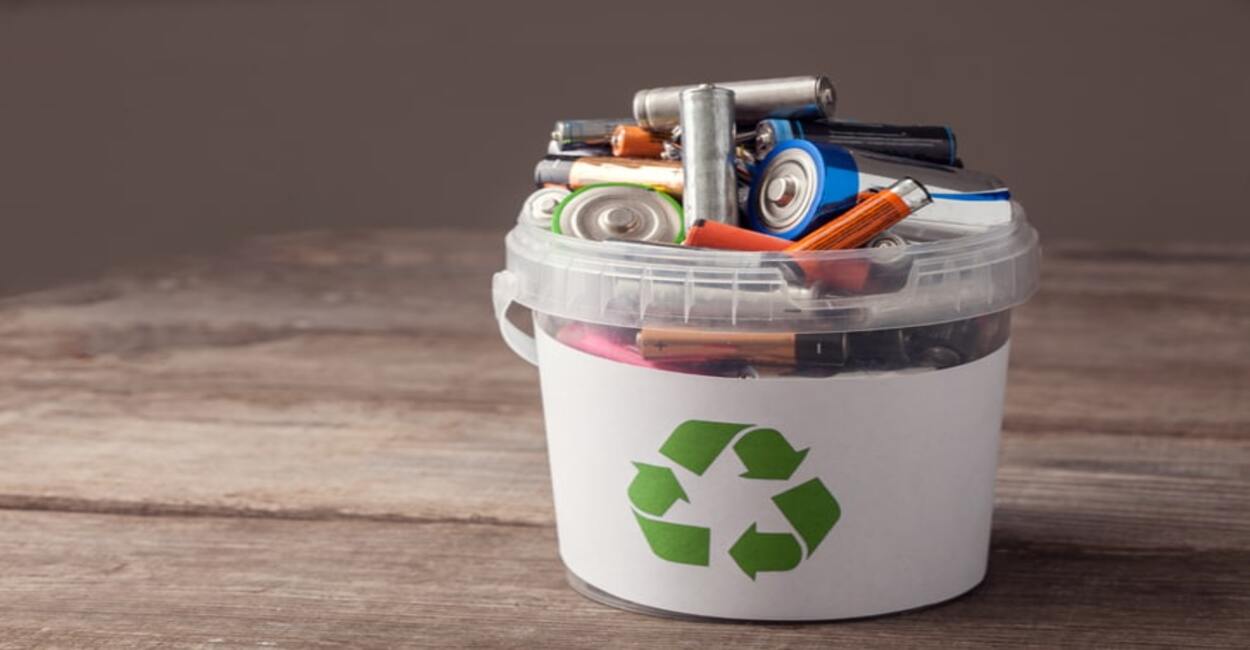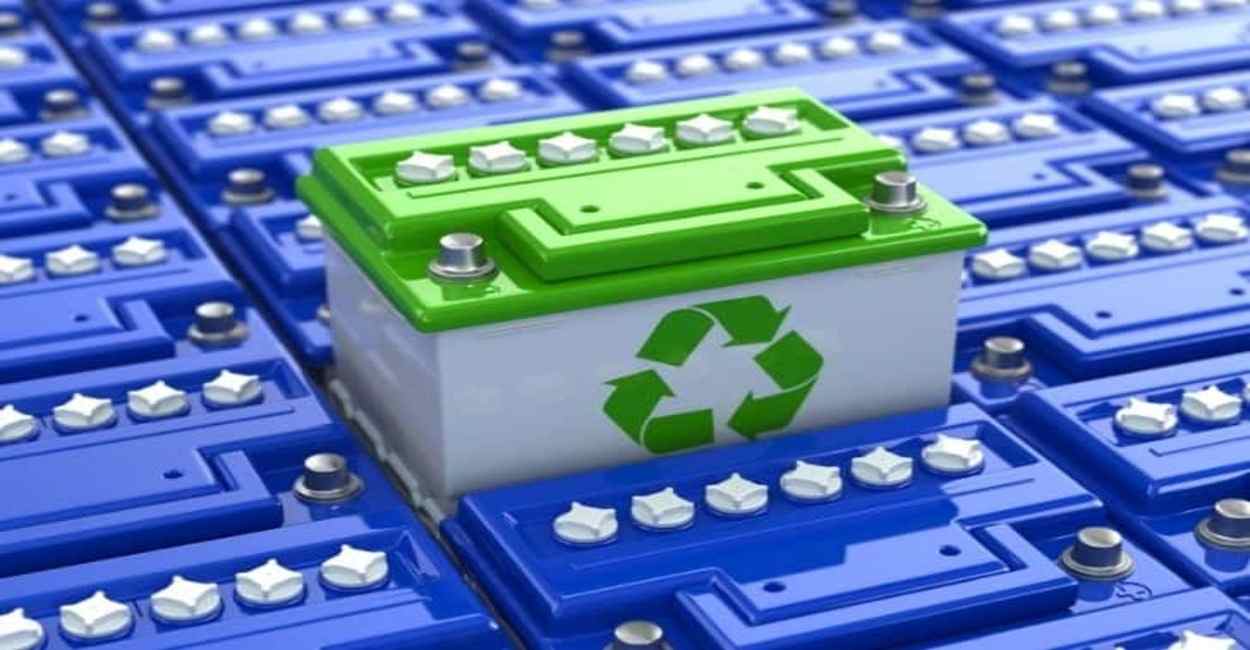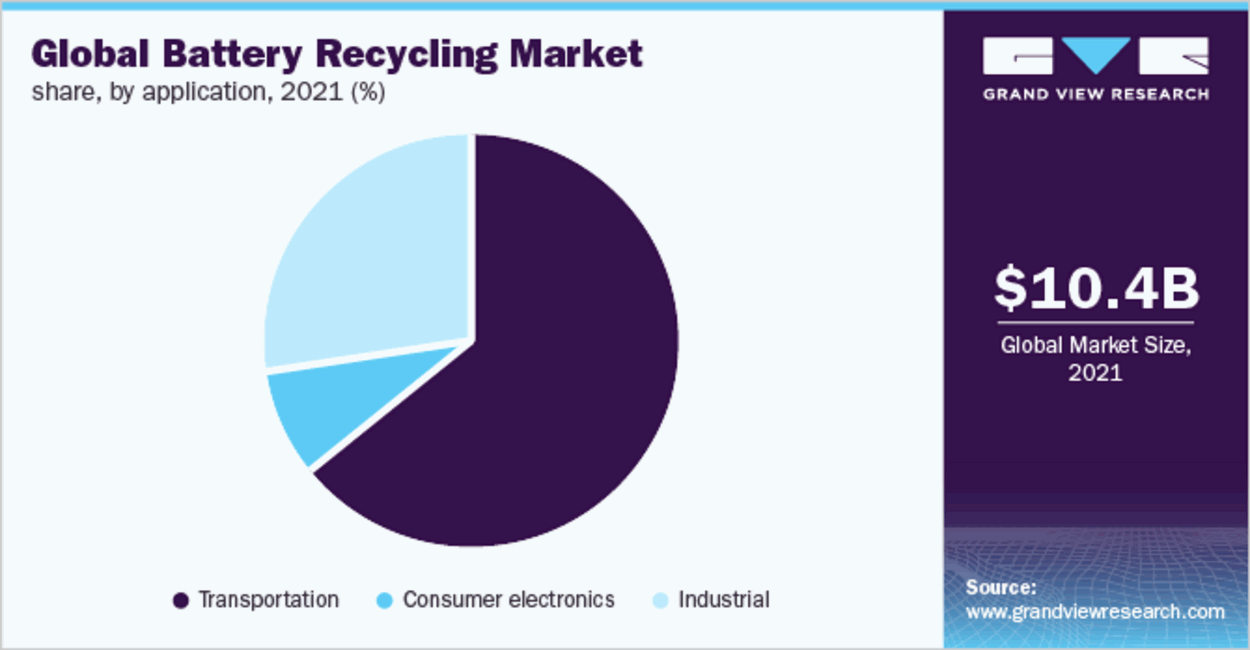Benefits Of Battery Recycling

With the increasing usage of technology, batteries have become one of the basic necessities of everyday life.
As per EPA, there were about 2.9 billion batteries that were sent to landfill in the U.S.
Batteries are the contamination of heavy metals, including lead, zinc, and mercury. These metals are considered hazardous substances to the environment when improperly disposed of. That’s why it’s important to recycle batteries. Here we have mentioned some of the benefits of recycling spent batteries.
Reducing Waste Sent to Landfill
Despite most types of batteries being recyclable, research has suggested that only 10–12% of batteries sold annually in North America are recycled. By recycling used batteries, the environment can be helped by reducing the amount of waste sent to landfill.
Preventing Pollution
Due to the heavy metal content, discharged batteries sent to landfill can corrode that generally be used to release toxins into the air and land. These toxins can be harmful to the environment.
Conserving Natural Resources
There is a finite amount of natural resources; thus, this is the responsibility of an individual to protect these natural resources from further depletion. Batteries are produced from natural resources of metal elements, including lead, Lithium, nickel, and other rare earth elements. Scientific researchers have claimed that recycling batteries can save 51.3% of natural resources. The recycling of batteries will contribute towards conserving our natural resources, saving energy, and reducing greenhouse gas emissions.
Producing New Products
The used and old batteries can be repaired. Recycled batteries can be repurposed to create new batteries or other appliances. Although they may seem small, some components of batteries can be used by the steel industry for the creation of an array of products.
Generating New Jobs
By making the commitment to recycling the old ones to create new jobs in the recycling and manufacturing industries in the United States. As per the study, 75% of the diversion rate for municipal waste by the year 2030 will generate 2.3 million jobs within the recycling industry in the U.S.
Benefits Of Recycling Lithium Ion Batteries
1. Batteries contain harmful chemicals
Batteries contain harmful chemicals, which is the reason why we should seriously consider recycling our used batteries. Batteries are made up of harmful chemicals that can be hazardous to human health when left around the house, as some of these chemicals can linger in the air you breathe. The acids and heavy metals used in batteries disposed of in the landfill the toxins can destroy wildlife and pollute water sources.
2. Recover non-renewable materials
The production of batteries involves various stages, like raw materials being mined, processed, turned into batteries and then into waste. Some of the materials that are involved in the production of batteries are lead, nickel, steel, zinc, mercury, cobalt, Lithium, and silver. All of these components aren’t renewable; they are infinitely recyclable and are also not recycling properties making these materials no longer available for use and therefore negatively impacting the economy.
3. Reduce the cost of new batteries
By recycling our waste batteries and recovering & reusing the materials, we can then directly ensure that they are used for forward manufacturing, which helps to reduce production costs and ensures that competitively priced products are available for purchase.
4. Reduce the risk of fire & explosion
Relative to the vast numbers of batteries in use, battery explosions and fires are the rare factors in achieving. However, they can occur, and fires in waste facilities can be very hard to extinguish.
Some types of batteries are more likely to cause fires than others, but all batteries need to be treated with care. Once the batteries are damaged or exposed to heat and proper storage and handling can minimize the fire and explosion risk.
5. Reduce costs to local councils
Like any recycling, the recycling of the batteries can also be beneficial in minimizing the waste operation, which is funded by Council Tax that householders pay.
6. Batteries are easy to recycle
The disposal and recycling of batteries is an easy process. Now the question arises do you know where your nearest battery recycling point is?
There are many places that offer battery collection points, such as retailers and even your local supermarket. One must take their portable waste batteries with you when one goes shopping or visits a public space.
Batteries are easy to recycle when disposed of properly but always make sure that it also begins with proper storage.
Some Of The Battery Recycling Facts
• Americans purchase nearly 3 billion dry-cell batteries every year to give power to radios, toys, cellular phones, watches, laptop computers, and portable power tools.
• Inside a battery, a reaction with heavy metals with chemical electrolytes is done to produce the battery’s power.
• Wet-cell batteries contain a liquid electrolyte, commonly powering automobiles, boats, or motorcycles.
• Nearly 99 million wet-cell lead-acid car batteries are manufactured each year.
• Recycling batteries keeps heavy metals out of landfills and the air. Recycling saves resources because recovered plastic and metals can be used to produce new batteries.
How Are Lithium Batteries Recycled?
The recycling of lithium-ion batteries gives us the opportunity to get raw materials.
There is an existing threat to the availability of Lithium that is needed to produce this type of battery. This threat redirects attention to ensure a continuous supply of materials required for the green revolution through the reuse and recycling of batteries.
The consumption of Lithium is done in various sectors such as construction, pharmaceuticals, ceramics, glass, and the automotive industry.
The recycling of lithium-ion is one of the major parts to accomplish in the automotive industry. The rising popularity of hybrid cars is increasing the demand for Lithium in the world.
In the future, the recycling of lithium-ion batteries will be expected to be one of the main sources of Lithium. Potential fluctuations in the prices of Lithium will affect the overall sales prices of cars.
Hence, recycling is considered a major factor that affects the fluctuations of the pricing due to geopolitical due to or other types of barriers.
There are numerous challenges that occur in the path of the supply of Lithium in the future.
Manufacturers are searching for various alternative ways to overcome lithium dependence by reusing lithium batteries in other applications and also by recycling batteries after they have completed their lifespan.
However, on the basis of the economic conditions, there is no reason behind the recycling of batteries. Recycled Lithium has up to five times the price of Lithium produced by the cheapest saltwater process.
The major property of Lithium is that it is 100% recyclable.
The automotive battery recycling market is mainly influenced by the technology used in the products they facilitate. Therefore, the key differentiating factor is the price. This tends to reduce the cost-effectiveness of recycling companies.
The main challenge that obstructs the industry is the long-term nature of the financial investments that are required by the market participants to develop specialized waste disposal services.
The increase in the production and consumption of lithium batteries results in an increasing demand for recycling. Recycling is a necessary task for environmental, economic, and health as well.

Environmental Impact Of Battery Production And Disposal
Although electric vehicles are emission-free, at least when they are powered by electricity from renewable sources, they still cause a climate impact that is basically derived from the manufacturing of the car and, not least, the battery. Mining and refining of battery materials and manufacturing of cells, modules, and packs require significant amounts of energy which could generate greenhouse gas emissions.
Environmental impact of lithium batteries
Electric cars are powered by lithium batteries, and their production entails high CO2 emissions.
The cost of lithium batteries is around 73 kg CO2-equivalent/kWh. Production of a single battery with a range of 40 kWh (e.g. Nissan Leaf) and 100 kWh (e.g. Tesla) emit 2920 kg and 7300 kg of CO2, respectively.
A lithium-ion battery can be divided into three main components: The very first one is the cells, which contain the active materials, then the battery management system, and last, the pack, which is the structure the cells are mounted in.
Aluminum is important for the pack component but is a very energy-intensive material, representing 17% of the total battery’s carbon footprint.
The cells are the representation of the majority of the energy and carbon footprint of the production of lithium batteries. Specifically, 40% of the total climate impact of the battery comes from the mining, conversion and refining step of the active materials of cells where Nickel, Manganese, Cobalt (NCM) and Lithium are processed into cathode powder.
The actual cell production is the second most energy-demanding activity and represents 20% of the total CO2/kWh (14 kg CO2/kWh). This number is highly dependent on the capacity of the plant.
One of the reasons for the high carbon footprint of producing lithium batteries is the source of energy utilized at the time of manufacturing. The manufacturing of batteries is done at places where the mix of energy is not so clean (such as China, which produces 60% of its electricity from coal).
If the batteries are made in countries with higher percentages of greener electricity sources (renewables+nuclear), then the carbon footprint of the batteries will reduce.
Battery Recycling Statistics

Conclusion
There is no particular reason why lithium batteries will replace the usage of fossil fuels, especially in the electric and transportation sectors. So, the mining processes and disposal things need to be done efficiently and appropriately to reduce and further eliminate pollution and environmental impact.

